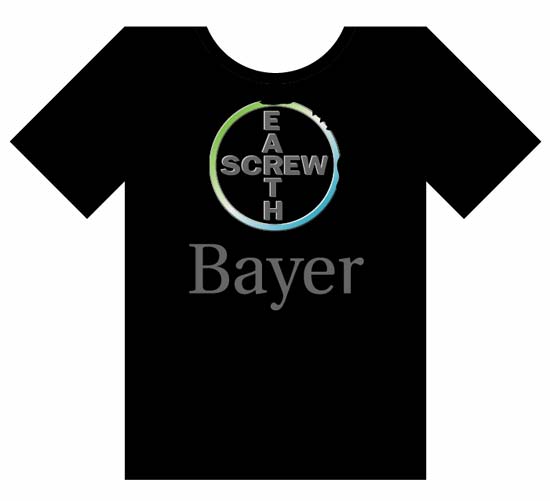Rosenberg gives Bayer papers to U.S. Holocaust Museum
CBGnetwork | 05.01.2006 17:57 | Repression | Cambridge

Rosenberg gives Bayer papers to U.S. Holocaust Museum
A 13-year effort by a Pittsburgh man, and a committee that worked with him, to show Bayer AG's culpability in the Holocaust produced a collection of minutes, notes, transcripts, videotapes and photos that scholars everywhere may now study. Bayer AG is a German corporation whose American operations are based in Pittsburgh.
David Rosenberg of Pittsburgh, who chaired the Committee for Appropriate Acknowledgment, recently donated those records - enough to fill 11 boxes - to the United States Holocaust Memorial Museum (USHMM) AG in Washington, D.C.
Rosenberg signed the deed of gift agreement on Dec. 16, which formally donates the collection to the museum and grants it permission to make the papers available for study. "They're available now (for study)," said USHMM Archivist Rebecca Erbelding. "It's a pretty quick turn-around."
Rosenberg, an archivist at the Archives Service Center of the University of Pittsburgh, said he had been looking into Bayer's role for years on his own with support from his friends. The committee itself began work in 1998 as a response to contributions the Bayer Foundation made to local Jewish organizations, including the Holocaust Center of the United Jewish Federation and the Jewish Community Center's capital campaign.
Between 1990 and 2003, working in Pittsburgh, Rosenberg, and later the six-member committee, researched and documented Bayer AG's corporate culpability during the Holocaust and pushed for its acknowledgment and atonement.
Bayer was part of I.G. Farben during the Holocaust. Farben used slave labor from Auschwitz to build a factory there that was intended to produce artificial rubber. Farben also had a hand in production of Zyklon B, the gas used to systematically murder Jews and other peoples in the gas chambers. Farben also used forced labor at its Leverkuesen plant near Cologne, Rosenberg said. Today, Leverkusen is the corporate headquarters for Bayer, AG.
Rosenberg's effort produced resolutions by the Greater Pittsburgh Rabbinic Association in 1990 and 1991 recommending that references to Bayer's role in the Holocaust be included if and when Bayer made donatons to the Jewish community.
Bayer USA President and CEO Helge Wehmeier made a dramatic, but personal, apology to Elie Wiesel on Dec. 13, 1995, before the Nobel laureate and Holocaust survivor lectured at the Carnegie Music Hall in Oakland. To date, though, Bayer has never issued a corporate apology, despite a trip Rosenberg made to Germany in April 1999 to speak at a Bayer stockholders meeting in Cologne.
"They stuck to their guns [saying], 'we're not the same company,'" Rosenberg said. "This is the game they played - the shell and pea game." Bayer, like other German companies from that era did pay into a settlement fund for survivors of forced or slave labor.
With the committee disbanded, Erbelding said, the collection can do more good at the Holocaust Museum than in Pittsburgh. "At least here the papers will continue to be part of the discussion and an active scholarly debate," Erbelding said. In addition to Rosenberg, the members of the committee were Sandra M. Fox, Dr. Edward S. Friedman, Meir Israelowitz, James Kramer, Ivan Frank, Wendy Goldman and the late Steven Sapolsky. While it was in existence, the committee received support from several congregation mens' clubs, the Greater Pittsburgh Rabbinic Association, Tree of Life Congregation, the Ohio-Allegheny Valley Region of B'nai B'rith and the Three Rivers Community Foundation.
Rosenberg's gift is an unusual one. The Holocaust Museum's archives typically receive collections of authentic Holocaust era material and scholarly notes as gifts. "As far as I know this is the first collection from a nonauthor of a committee's work to address this issue," Erbelding said.
While Bayer never officially acknowledged any culpability in the Holocaust, Rosenberg said the committee had an impact. "I think we succeeded in bringing this issue to public attention in Pittsburgh and linking up with German groups and other like-minded people," he said, "but, they (Bayer) could have gone farther and could still go farther."
(By Lee Chottiner, Executive Editor,
 lchottiner@pittchron.com.)
lchottiner@pittchron.com.) please also read:
Pittsburgh Post-Gazette: Jew, Christian team up to stress German firms' culpability for war horrors
Reuters: Wartime slave workers seek cash from German firms
Materials About Bayer´s Nazi-past
Coalition against BAYER-dangers (Germany)
www.CBGnetwork.org
 CBGnetwork@aol.com
CBGnetwork@aol.com Fax: (+49) 211-333 940 Tel: (+49) 211-333 911
please send an e-mail for receiving the English newsletter Keycode BAYER free of charge. German/Italian/French/Spanish newsletters also available.
Advisory Board
Prof. Juergen Junginger, designer, Krefeld,
Prof. Dr. Juergen Rochlitz, chemist, former member of the Bundestag, Burgwald
Wolfram Esche, attorney-at-law, Cologne
Dr. Sigrid Müller, pharmacologist, Bremen
Eva Bulling-Schroeter, former member of the Bundestag, Ingolstadt
Prof. Dr. Anton Schneider, construction biologist, Neubeuern
Dorothee Sölle, theologian, Hamburg (died 2003)
Dr. Janis Schmelzer, historian, Berlin
Dr. Erika Abczynski, pediatrician, Dormagen
CBGnetwork
 e-mail:
CBGnetwork@aol.com
e-mail:
CBGnetwork@aol.com
 Homepage:
http://www.CBGnetwork.org
Homepage:
http://www.CBGnetwork.org